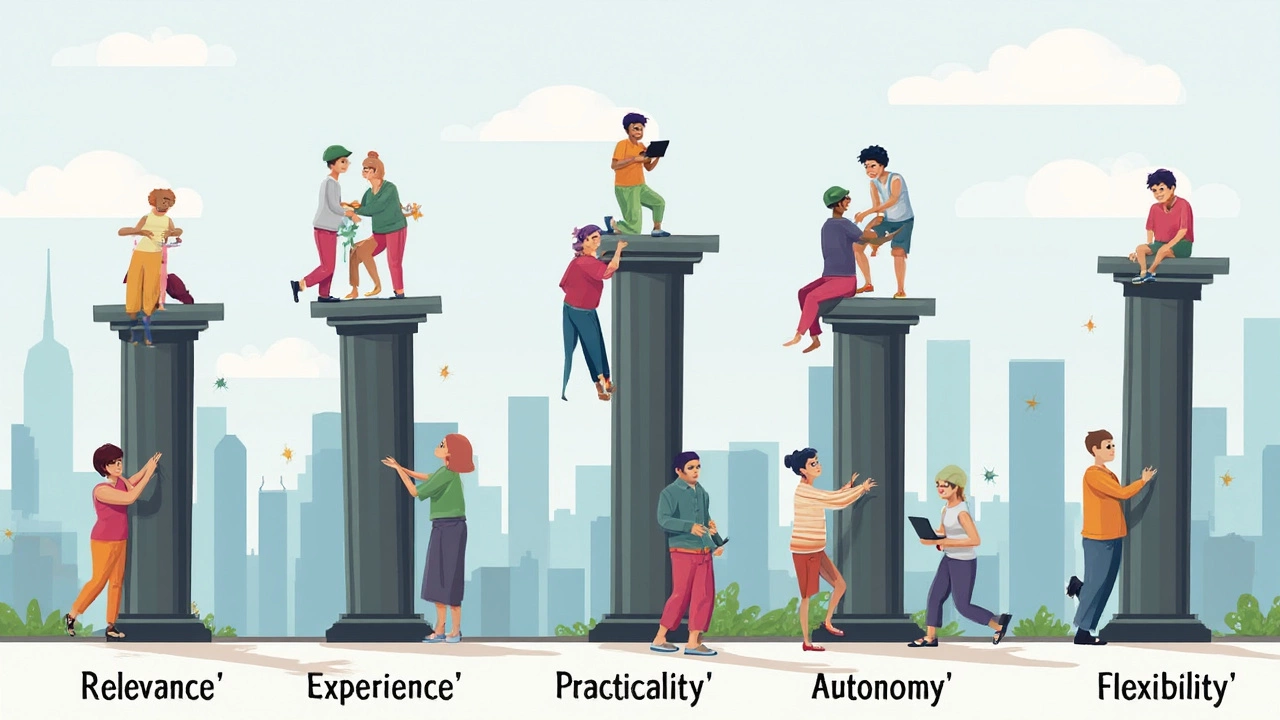-
20
- 0

Five Key Characteristics of Adult Education
If you’ve ever signed up for a night class or online workshop, you know adult education feels totally different from sitting in a school classroom as a kid. Adults don’t just show up because it’s required—they usually have a reason. Maybe it’s getting ready for a better job, hoping to switch careers, or just wanting to keep up with the fast changes around us.
One thing is clear: adult learners bring a ton of life experience and motivation to the table, and education for adults can’t be one-size-fits-all. Grown-ups tend to need learning that fits into their busy lives and connects with their real-world goals. They want answers, not just lectures. It’s not about memorizing facts, but about learning something useful and immediate. If you’re looking to make the most out of any course or training as an adult, you’ll want to know what makes this type of learning work.
- Goal-Oriented Learning
- Life Experience as an Asset
- Self-Direction and Independence
- Relevance and Practicality
- Diverse Motivations for Learning
Goal-Oriented Learning
Adult learners typically don’t go back to class just for fun—they have clear goals in mind, whether it’s scoring a promotion, learning tech skills for a new career, or personal development. Research from the National Center for Education Statistics found that over 60% of adults in continuing education programs are motivated by direct job advancement or skill improvement. It’s all about reaching a result, not just swimming in theory.
Having a goal in mind changes everything. Adults want to know: “How will this help me at work?” or “Will this training actually make daily life easier?” If the answer isn’t obvious, it’s way harder to stay motivated or finish the course. So, goal-focused learning means teachers and trainers need to connect each lesson to a practical benefit or a step closer to that goal.
- Set clear learning targets—make it obvious what skill or outcome you’ll walk away with.
- Break big goals into bite-sized steps, so milestones feel more manageable.
- Encourage adults to use what they’ve learned ASAP, whether it’s trying out new software or applying communication tips at work.
It helps to track progress and see how learning is paying off. Here’s a simple table showing what adult learners say keeps them on track:
| Motivator | Percentage (%) |
|---|---|
| Job Promotion or Advancement | 39 |
| Skill Improvement | 23 |
| Personal Fulfillment | 21 |
| Switching Careers | 12 |
| Other | 5 |
Notice how work- and skill-related reasons top the chart. When a course or program keeps these goals front and center, adults stick with it and actually use what they learn. That’s what makes adult education work for real life, not just exams.
Life Experience as an Asset
If you’ve ever tried to teach your parents how to use a new phone, you get it—adults don’t start as blank slates. They show up with decades of know-how, skills, habits, and stories. This is what makes adult education stand out: every learner brings real-life experience that shapes what and how they learn.
Instead of ignoring these experiences, good adult education weaves them right into the lessons. Teachers who use examples that connect to work, family, or personal interests see students understand faster and engage more deeply. According to a 2023 survey by the National Council for Continuing Education, 78% of adult learners say their past experience was directly useful in learning new skills.
Here’s where it gets practical. When adults share experiences, it helps everyone in the group:
- Breaks down tricky concepts using familiar situations.
- Builds a sense of community and trust inside the class.
- Lets people learn from actual mistakes and wins, not just theory.
Check out this simple side-by-side:
| Traditional School | Adult Education |
|---|---|
| Focus on memorizing facts | Connects new info to work and life |
| Same material for everyone | Customizes learning to life experiences |
| Little time for discussion | Encourages sharing real stories |
The takeaway? As an adult learner, your everyday problem-solving and work history aren’t just background—they’re some of your strongest study tools. Use them and don’t be shy about sharing; you could be making the lesson better for everyone around you.

Self-Direction and Independence
One thing that really makes adult education stand out is how much independence adult learners bring. Unlike kids and teens, most adults don’t wait for someone else to tell them what or how to learn. Research from the American Institute for Learning and Human Development shows up to 85% of adults prefer some control over their learning path. They want the freedom to choose what fits their goals, schedule, and interests.
This self-direction can be both a blessing and a challenge. On the plus side, adults are more likely to search out resources, ask specific questions, and work at their own pace. For example, my neighbor decided to learn coding for a mid-life career change—she used YouTube tutorials, signed up for a class, and joined a local online group. Nobody told her to do it; she made her own plan and stuck to it.
Good programs for adults recognize this need for control. They offer flexible timelines, access to materials outside regular hours, and let students set personal goals. Here’s a quick glance at some common ways learning is structured for adults:
| Feature | Benefit |
|---|---|
| Self-paced modules | Learn anytime, fits busy schedules |
| Optional assignments | Choose what matters to your own needs |
| Discussion groups | Share diverse ideas and ask real-world questions |
| Personal projects | Directly apply learning to your own life |
If you’re jumping into a new class or training, try to set clear goals that matter to you. Don’t wait for someone else to organize everything. You’re in the driver’s seat, so pick resources and tools that fit your life. If you ever get stuck, look for forums, groups, or mentors to help steer you back on track. Adult students who take charge usually enjoy learning more and stay motivated longer.
Relevance and Practicality
No one wants to sit through hours of learning that has nothing to do with real life. For adults, learning needs to be connected to what’s happening in their lives right now—jobs, family needs, or personal growth. This is where relevance and practicality come in. Adults are more likely to stick with a course if the material helps them solve real problems at work or at home. If you can use it today, you’re more likely to care about learning it!
Here’s something wild: According to the U.S. Department of Education, courses that tie directly into job skills have a 75% higher completion rate among adults than those based only on theory. That’s a huge gap, and it tells you how practical content keeps people engaged.
What does practical learning look like? Think hands-on workshops, group projects, case studies, or lessons that let you practice skills you’ll use at work or in daily routines. For instance, if you join a digital marketing course, you might create a real campaign for your own small business instead of just reading about ad strategies. If you’re picking up a new language, it makes way more sense to practice actual conversations instead of filling out endless worksheets.
Here’s a quick comparison to show how practical learning stands out:
| Traditional Learning | Practical Adult Education |
|---|---|
| Lectures & Exams | Projects, Simulations, Real-World Tasks |
| Theory-Focused | Skill-Focused |
| Little Job Relevance | Tied to Daily Work |
If you’re picking a program, always check the course outline. Look for words like "case study," "real-world application," or "workplace project." That’s your sign it’s built for your goals, not just textbook learning. Focus on adult education resources that encourage you to use what you learn right away. Adult learning works best when it solves your real problems, and you can see results fast.

Diverse Motivations for Learning
Adults don’t just sign up for a class because someone tells them to. Their reasons are all over the map, and this is what sets adult education apart. Some are hoping to move up at work, while others just want to pick up a new hobby, feel more confident about technology, or finish a degree they started years ago. Motivation in adults is usually personal and tied to what’s happening in their lives right now.
Research from the U.S. Department of Education found that over 70% of adult learners join courses to improve job skills, while nearly 40% do it for personal growth or enjoyment. This is why you’ll see such a mix of people in any adult class, all with different stories, backgrounds, and goals.
Check out this breakdown of common motivations among adult learners (based on a 2023 survey):
| Motivation | Percentage of Learners |
|---|---|
| Career advancement | 55% |
| Personal interest/hobby | 27% |
| Finishing or upgrading a degree | 10% |
| Keeping up with technology | 5% |
| Family needs (helping kids, etc.) | 3% |
So what does this mean for you? If you’re an adult learner, it’s a good idea to ask yourself what’s really driving you. Are you hoping to land a new job, get ahead where you already work, or just curious about something new? Knowing your true motivation helps you stay focused when the course gets tough or life gets busy. And if you’re planning a course or training for adults, you’ve got to recognize that people will show up with all sorts of goals, so allowing for plenty of flexibility and options just makes sense.
For anyone teaching or designing adult learning programs, here are a few quick tips:
- Offer a choice of topics or assignments, so learners can connect to what matters most to them.
- Let people set some of their own goals within the course.
- Make space for learners to share their motivations and experiences early on—it builds community and helps everyone get more out of the course.
With so many reasons to keep learning, the key is turning personal motivation into real progress. The more clear you are about your "why," the more you’ll get from your next class or training.
Write a comment
Tags Weight
- education
- exam preparation
- study tips
- adult education
- online courses
- adult learning
- lifelong learning
- distance learning
- GCSE revision
- online education
- private tutoring
- special needs education
- scholarships
- remote learning
- scholarship tips
- financial aid
- international students
- effective learning
- e-learning
- education funding

Written by Elara Winslow
View all posts by: Elara Winslow